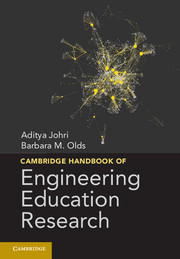Book contents
- Frontmatter
- Dedication
- Contents
- Editors
- Contributors
- Foreword
- Acknowledgments
- Introduction
- Chapter 1 Chronological and Ontological Development of Engineering Education as a Field of Scientific Inquiry
- Part 1 Engineering Thinking and Knowing
- Part 2 Engineering Learning Mechanisms and Approaches
- Chapter 8 Problem-Based and Project-Based Learning in Engineering Education
- Chapter 9 Case Studies in Engineering
- Chapter 10 Curriculum Design in the Middle Years
- Chapter 11 Engineering Design Education
- Chapter 12 Adaptive Expertise and Knowledge Fluency in Design and Innovation
- Chapter 13 Learning Disciplinary Ideas and Practices Through Engineering Design
- Part 3 Pathways into Diversity and Inclusiveness
- Part 4 Engineering Education and Institutional Practices
- Part 5 Research Methods and Assessment
- Part 6 Cross-Cutting Issues and Perspectives
- Index
- References
Chapter 12 - Adaptive Expertise and Knowledge Fluency in Design and Innovation
Published online by Cambridge University Press: 05 February 2015
- Frontmatter
- Dedication
- Contents
- Editors
- Contributors
- Foreword
- Acknowledgments
- Introduction
- Chapter 1 Chronological and Ontological Development of Engineering Education as a Field of Scientific Inquiry
- Part 1 Engineering Thinking and Knowing
- Part 2 Engineering Learning Mechanisms and Approaches
- Chapter 8 Problem-Based and Project-Based Learning in Engineering Education
- Chapter 9 Case Studies in Engineering
- Chapter 10 Curriculum Design in the Middle Years
- Chapter 11 Engineering Design Education
- Chapter 12 Adaptive Expertise and Knowledge Fluency in Design and Innovation
- Chapter 13 Learning Disciplinary Ideas and Practices Through Engineering Design
- Part 3 Pathways into Diversity and Inclusiveness
- Part 4 Engineering Education and Institutional Practices
- Part 5 Research Methods and Assessment
- Part 6 Cross-Cutting Issues and Perspectives
- Index
- References
Summary
Introduction
This chapter presents an overview of the adaptive expertise framework and describes how this framework holds promise for exploring knowledge fluency in the context of engineering design and innovation. Adaptive expertise is linked to research on knowledge transfer and the development of expertise. Each of these theoretical approaches explores how one recognizes when knowledge learned in one setting may apply in a novel setting, and the mechanisms for transfer of knowledge when challenged by an unfamiliar or ambiguous situation.
The adaptive expertise framework is directly applicable in the context of design and innovation given the emphasis on how one develops adaptiveness in learning, and how to apply knowledge fluidly. The process of design and innovation involves developing a solution where one does not yet exist. From this perspective, every design situation is novel, embeds ambiguity, and has no one correct answer. The very nature of design requires one to recognize how prior knowledge might apply under new circumstances. Furthermore, research suggests that the nature of knowledge one employs in the process of design innovation is nuanced, complex, and spans the cognitive, metacognitve, and affective domains.
- Type
- Chapter
- Information
- Cambridge Handbook of Engineering Education Research , pp. 227 - 242Publisher: Cambridge University PressPrint publication year: 2014
References
- 52
- Cited by

